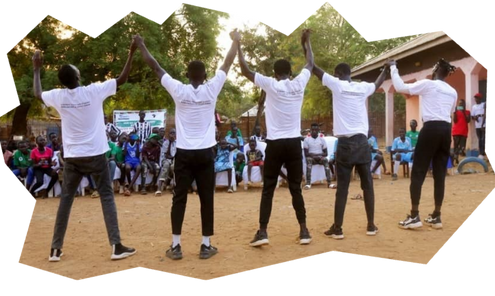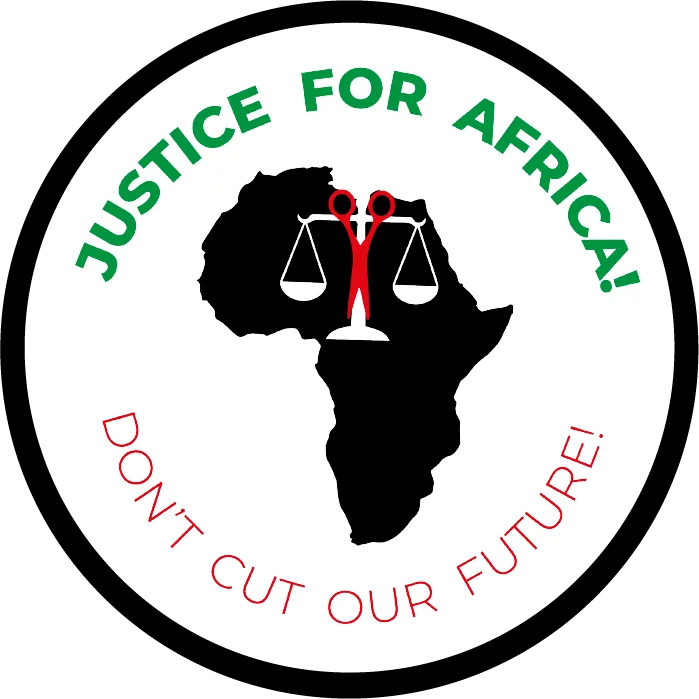
OUR MISSION STATEMENT
Justice for Africa aims to expose and end the systematic global injustices against Africa that are undermining the right to quality education for all. We do this by collectively mobilising and advocating against rising debt, tax, aid and climate inequalities created by the world’s richest countries and for Africa to have fair representation in global governance. We are an open call to action led by African youth and student organisations that harnesses the power of international solidarity to achieve transformational global change.
OUR PRINCIPLES
WE FOCUS ON ENDING GLOBAL INJUSTICE
Justice for Africa’s core aim is to end the systemic injustices perpetrated against Africa in the international system. We agree that African governments and institutions can and must do more domestically, for example on education funding. However, this is already the core focus of many of our partners and members’ related campaigns. Instead of duplicating existing efforts, Justice for Africa will bring together those organisations who want to also tackle the global injustices behind the increasing poverty and inequality in Africa. Where we do make demands of African governments and institutions this will focus on their role in strongly advocating for campaign priorities in international fora.
WE ARE UNITED BY DEFENDING THE RIGHT TO EDUCATION
We aim to defend the right to education for all. The cuts to education in Africa must be reversed – African per child education budgets are half what they were 50 years ago even though the world is many times richer. The growing gap in education expenditure per student is expanding global inequality for the next generation. Education is the key to unlocking all other human rights too and this deadly trend must be reversed.
WE PORTRAY A TRUE AND JUST REPRESENTATION OF AFRICA
Africa has long been misrepresented both through deliberate and racist reframing by those who steal Africa’s resources and through exploitative and stigmatising imagery from would be allies. However, responding by ignoring the negative things that are happening or denying the lived experiences of those excluded from education is not the answer. Justice for Africa aims to portray a true and just representation of Africa, sharing our continent’s beauty and potential alongside direct testimony from those living in marginalised communities, powerful evidence of the growing hardship faced by young Africans and the international injustices causing it.
WE ARE LED BY WHO WE SERVE AND AND BELIEVE IN INTERNATIONAL SOLIDARITY
We are a movement for Africa, by Africa, with the majority of the campaign’s leadership African youth and student organisations whose rights are most impacted by rising injustice against the continent. The campaign aims to unite the wider pan-African movement and young people across the world behind this African leadership. Ending international injustices and creating a more equal future for the world’s young people will only be possible when young people outside Africa understand what is really happening and have the courage to protest against it.
WE ARE UNAPOLOGETICALLY POLITICAL
Justice for Africa is a political responsibility and not an act of charity. The systemic injustices faced by Africa were created by international political fora and they are of such a scale that they can only be ended by political action. Extreme poverty will only be eradicated when the injustice ends. We utilise a human rights approach to our demands and work and are unapologetically political in our analysis. .
OUR POLICY DEMANDS
TAX JUSTICE
Rationale: Tax revenue is the main sustainable source of income for governments and is crucial to funding universal public services such as education. Africa’s vast and in-demand natural resources should be yielding huge tax revenue for African governments yet the income and profits from these resources are taken by other countries in a system of global tax injustice.
Justice for Africa therefore demands:
- All governments must support the critical UN Tax Convention negotiations and the introduction of a binding and just new international tax system that ensures tax is paid where wealth is created.
- All governments must stop turning a blind eye to companies exploiting Africa by tax avoidance and evasion. Prosecutions need to be sought for those breaking the law and where fines occur in another country, the money must be sent to the country where the offence took place.
- African governments must stop tax exemptions for multinational and national corporations and strengthen their capacity to collect taxes and stop illicit financial flows.
DEBT JUSTICE
Rationale: The global debt crisis is at an all-time high and Africa is most at risk. 95% of those living in countries in debt distress are in Africa and annual debt servicing costs for low and middle income countries in sub-Saharan Africa are $100 billion a year. This is now more than is spent on education in sub-Saharan Africa.
Justice for Africa therefore demands:
- High-income governments use their disproportionate power in the global governance system to end the worst ever debt crisis by supporting an emergency issue of IMF Special Drawing Rights ringfenced to rectify 2021’s discriminatory allocation. This will cancel all debt for low-income countries and lower-middle income countries with debt servicing to income levels above the IMF threshold and provide additional financing for other low and lower middle income countries.
- High-income governments should support the African debt initiative and must agree to create a Sovereign Default Mechanism that gives countries the same protection as corporations with new rules so sovereign debt is only enforceable on future generations if a loan is publicly reported in debt registers with the approval of the parliament/assembly.
- African governments should work together as a united block to strengthen their negotiation power, as they have demonstrated with the UN Tax Convention, in securing structural reform to international debt processes and rejecting unjust debt that wasn’t properly approved by parliament or that was used for corrupt purposes.
DEVELOPMENT FINANCING JUSTICE
Rationale: Development financing is not an act of charity but political responsibility, and the very least rich countries can do to begin addressing the historical and modern exploitation of African people and resources. Yet growing aid discrimination means Africa has missed out on over $400 billion in ODA since 2016 alone and by 2021 just 2.4% of global climate finance had been allocated to sub-Saharan Africa despite the region’s high vulnerability to the devastating impact of a climate crisis caused by Western countries.
Justice for Africa therefore demands:
- High-income governments must fulfil their responsibility to provide 0.7% of GNI in ODA including:
Ending the aid discrimination against Africa by spending aid money in proportion to the countries where the world poorest live so Sub-Saharan African countries receive 0.3% of GNI in bilateral aid from all DAC donors
Ring Fencing 20% of ODA for long term education and 10% of ODA to social protection.
Mobilising full funding for climate adaptation and mitigation for all developing countries.
- African governments must ringfence 20% of their budget for education and a further 10% for child, maternity and disability benefits and universal school feeding programmes.
REPRESENTATION JUSTICE
Rationale: Global injustice is sustained and fuelled by unjust global governance structures. The world’s most powerful policy-making institutions, including the International Monetary Fund (IMF), World Bank, OECD and G20, continue to operate under frameworks that exclude or marginalise African voices. Global decision-making must be equal, democratic, and decolonised – it is unacceptable that the world continues to allow the wealthiest to make the rules the poor must live by.
Justice for Africa therefore demands:
- High-income governments must back instead of block international system reform, including equal representation of African countries and equal per person distribution of any global liquidity injections.
- High-income governments must support efforts to redistribute voting powers in the IMF to be equal, democratic and decolonised and reorganise IMF country teams to prioritise the needs of the counties they advise, including tax justice, cancelling unsustainable debt and ending loan conditionalities.
Justice for Africa
Justice for Africa: Don’t Cut Our Future is an African youth- and student-led global campaign demanding an end to this injustice.
